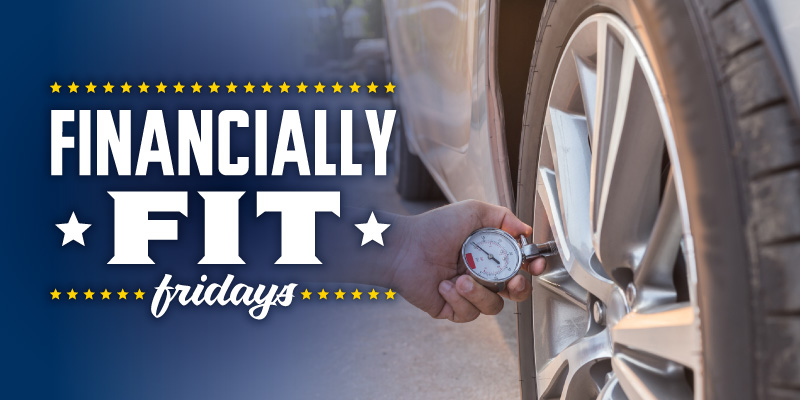All-Wheel Savings: Caring for Your Car Tires
You should always take care of your wheels—and we’re not just talking about the car itself—because it will save you money in several ways. Properly maintained tires get better mileage, so you’ll spend less on gas. Regular checks and rotations will help them last longer and prevent blowouts, which could cause costly damage to your vehicle and potential injury. Here are some tips on how to take care of your ride:
Monitor the Pressure
Air pressure is measured in pounds per square inch or PSI. The PSI number on the sidewall is the maximum amount of pressure, and therefore should not be the number you use when inflating. You can see the ideal PSI in the owner’s manual or on the driver’s side door frame. Check the pressure regularly, because even a perfectly healthy tire can lose up to two PSI per month. Underinflated tires have more rolling resistance, which means the engine burns additional fuel. It can also lead to heat buildup, causing treads to wear down more quickly.
Look at the Tread
Check your wheels monthly, looking for damage, cracks, punctures and bubbles on the sidewalls. You should also monitor the treads, as bald tires won’t grip the road well and affect steering and handling. Underinflation will cause your tires to wear on both edges, whereas center-worn treads indicate overinflation. Use a tread depth gauge or, alternatively, a penny. Insert the coin in the grooves upside down and facing you—if you can see the top of Abraham Lincoln’s head, your tread is too low. Replace damaged or bald tires immediately.
Remember to Rotate
If your tires are unevenly worn, it’s because they haven’t been properly rotated. During this process, each wheel is taken off and moved to a different position, making them last longer. Most tires should be rotated every 6,000 to 8,000 miles, or roughly every other oil change. However, if you notice any irregular wear on your wheels—even if you haven’t reached 6,000 miles yet—go in for a rotation.
Watch Your Speed
Going fast means a greater chance of tire damage due to heat buildup or road hazards. Excessive spinning can also cause faster wear. Check your owner’s manual to learn the vehicle load limit to avoid unnecessary stress wheel or engine stress.
Take care of your vehicle and it will take care of your wallet.

